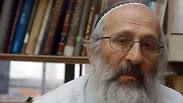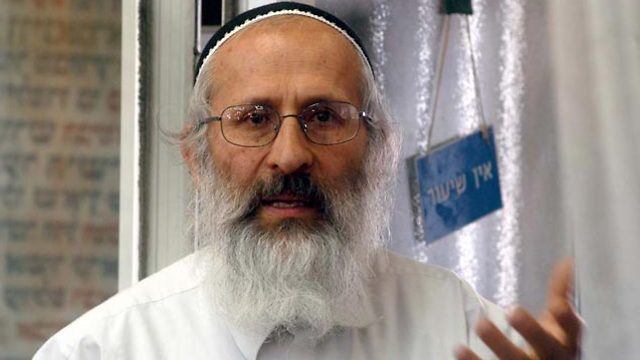
Rabbi Shlomo Aviner
צילום: גיל יוחנן
Rabbi Aviner: Forbidden to enlist in IDF if women serve in unit
Influential religious-Zionist leader tells yeshiva student in Q&A session, 'Either serve in a separate unit, or don't enlist for now. You cannot do the mitzvah of serving in the army by committing a transgression'; other leaders in sector come out against him: 'Saying that it is forbidden to enlist because the army is mixed is in itself preventing a mitzvah,' says Rabbi Ohad Terharlev.
Rabbi Shlomo Aviner, one of the prominent and influential leaders of religious Zionism, made yet another controversial comment on Tuesday when he declared that "until there is complete separation between men and women in the IDF—it is forbidden to enlist."
Young men and women in the religious Zionist sector are highly motivated to serve in the IDF, with record breaking numbers of both religious-Zionist men and women enlisting in recent years.
However, the issue of mixed-gender units has been controversial in the religious Zionist sector, with several rabbis coming out against women's service in general, and co-ed service in particular.
In a recent question and answer session on the website Kippah, Rabbi Aviner received a query: "I am a yeshiva student, and I am uncertain whether to enlist or not, because of the mixing of men and women in the army."
"It is a great mitzvah to go to the army, but alongside that one must uphold the Torah's instruction that men and women should be as far away from each other as possible," Aviner answered. "You need to ask for a unit that has no women, such as proper combat units or Haredi units."
The yeshiva student pressed the matter, saying this was an unrealistic demand as the IDF is not obligated to place non-Haredi soldiers in Haredi battalions and adding not everyone is suitable for combat units.
"If that is the case, then unfortunately, for now, you must not go to the army," Aviner responded. "Either (serve in) a separate unit, or don't enlist for now. You cannot do the mitzvah of serving in the army by committing a transgression."
The rabbi rejected the claim that his comments urged "rebellion against the IDF," saying, "We deeply love the IDF, and we will certainly enlist when the problem is remedied."
His answer to the yeshiva student, however, caused a storm in the religious-Zionist sector, with many criticizing his extremist message.
"Rabbi Aviner's call to dodge the IDF draft constitutes the crossing of a red line," the Ne’emanei Torah Va’Avodah organization said. "Disagreements with the army must be resolved with respectful discourse, as has been done and agreed with rabbis of religious-Zionism, and not in manners that give us a bad name for no good reason and unwinds the delicate fabic of the people's army."
Rabbi Ohad Teharlev, a member of Beit Hillel's executive board and head of the Israeli program at Midreshet Lindenbaum, also came out against Rabbi Aviner. "Saying that it is forbidden to enlist because the army is mixed is in itself preventing a mitzvah. Our students will continue enlisting en masse," he stressed.
"The IDF and the chief of staff are doing all they can to allow young religious men and women to serve in the army, while still following Halacha (Jewish law). We recently saw it in the changes made to the Joint Service Ordinance," Rabbi Teharlev continued. "Statements like that only give a bad name to the army and to Israel's male and female soldiers, who are elite unique people."
In response to the outrage over his comments, Rabbi Aviner told Yedioth Ahronoth: "I stand behind every word. I don't know all of those causing a storm."
Aviner, the rabbi of the settlement Beit El and the Ateret Cohanim yeshiva, is known for his controversial rulings, including his efforts to "convert" LGBTs, calls on women not to run for political office because it is immodest, and barring use of some emojis because they constitute "idolatry."
He is considered an influential and popular rabbi, among other things because he holds question and answer sessions with students via cellphone or the internet.












